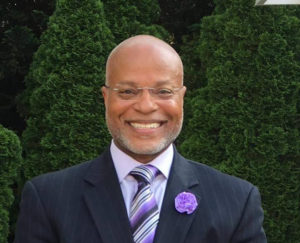Racial tensions will naturally run high when a majority refuses to acknowledge “the world is becoming browner” and large numbers of voters rally around a white man “wanting to win back America,” according to pastor and police chaplain Paul Anderson.
Despite a high profile in large churches and national organizations, a graduate degree, civic prominence in Raleigh, N.C., and a highly accomplished family, Anderson knows that in the public eye he is not just “a gentleman” but a “black gentleman.”
That is an important distinction for him and other African Americans because there “are people in law enforcement who still have issues with people of color,” he said.
As the senior volunteer chaplain for the Raleigh police department — whose chief is a black woman — Anderson is a strong advocate for police officers. He conducts a training block for new officers in which he leads discussion about why they want to be in law enforcement, about the sacredness of life and about considerations an officer must make when he or she is confronting people.
Anderson, 54, is president of the Raleigh Interdenominational Ministerial Alliance, which conducted an open dialog with the NAACP and Raleigh police at Mount Peace Baptist Church on July 11. It’s important that policemen and women be “peace officers,” preserving and protecting the peace in whatever jurisdiction they serve, he said.
“They’re trying to do their best, but unfortunately, like in ministry, we have some people who are not where they should be,” Anderson said. “Unfortunately, they are the ones getting the lime light.”
Still, speaking as he drove to Charlotte, N.C., to visit his 95-year-old mother for her birthday, Anderson bristled with energy and resentment, thinking of a rash of white police officers killing unarmed black men.
He recounted campaigns for equality and justice from the 1950s and 1960s and said the “unconscionable” things that happened to demonstrators then have “never stopped happening.”
He remembers one of his brothers being arrested by the National Guard while simply walking across campus. Anderson has been pulled over for simply “driving while black.”
Anderson noted the contrast: “When a white man carries a gun in public, he’s just carrying a gun in public. If a black man is carrying a gun in public, he’s getting ready to rob someone.”
“We’re not at the point of civil war. But people seriously need to check their emotions.”
Anderson, a 1991 graduate of Southeastern Baptist Theological Seminary in Wake Forest, N.C., left the pastorate of a church that had grown to 1,000 members after almost 18 years to start The Fountain of Raleigh Fellowship in 2009 because he felt his church was losing the interest of potential white members by preserving its black heritage and culture.
The Fountain identifies with the National Baptist Convention USA Inc., the Lott Carey Global Christian Missional Community and the Cooperative Baptist Fellowship. He calls membership of The Fountain “black, white and sage.” The Jewish Temple Beth Or hosted the new church until it bought property. The synagogue and church still interact regularly.
Almost seven years old, The Fountain attendance is 450 to 500. Limited parking requires two services and breakfast is served between services to promote fellowship and community.
Anderson laments that interactions between white police and black citizens are not the only place where race gets in the way. “We want black people to integrate white churches,” he said, “but we don’t want white people to integrate black churches.”
Worse, he feels many white contemporary churches are “modified plantations” that reach out to enlist young black professionals for their financial gifts but never put them on staff, or into leadership roles.
Most white Christians looking for a church “don’t want to hear from a black leader,” he said, despite similar education, oratory and leadership skills and church ministries that reflect those of any predominantly white church.
“White America still believes that worshipping in a black congregation doesn’t give them the same utility they’d have in a white congregation. We just need to be honest about it.”
Anderson’s own family reflects the country’s racial history. He possesses the bill of sale that enslaved his Nigerian paternal great-great grandfather. His maternal great-great grandfather was white.
Anderson is the youngest of nine children, born to a mother, then 41, who ignored a doctor’s health advice to abort the pregnancy. Members of his extended family are Filipino, Hawaiian and Italian.
Although his father basically taught himself to read, all of Anderson’s siblings are college graduates and more than half have graduate degrees.
“Our parents told us that with prayer and work we could make a difference,” he said. “I’m not here just to exist. I’m here to make a difference.”

